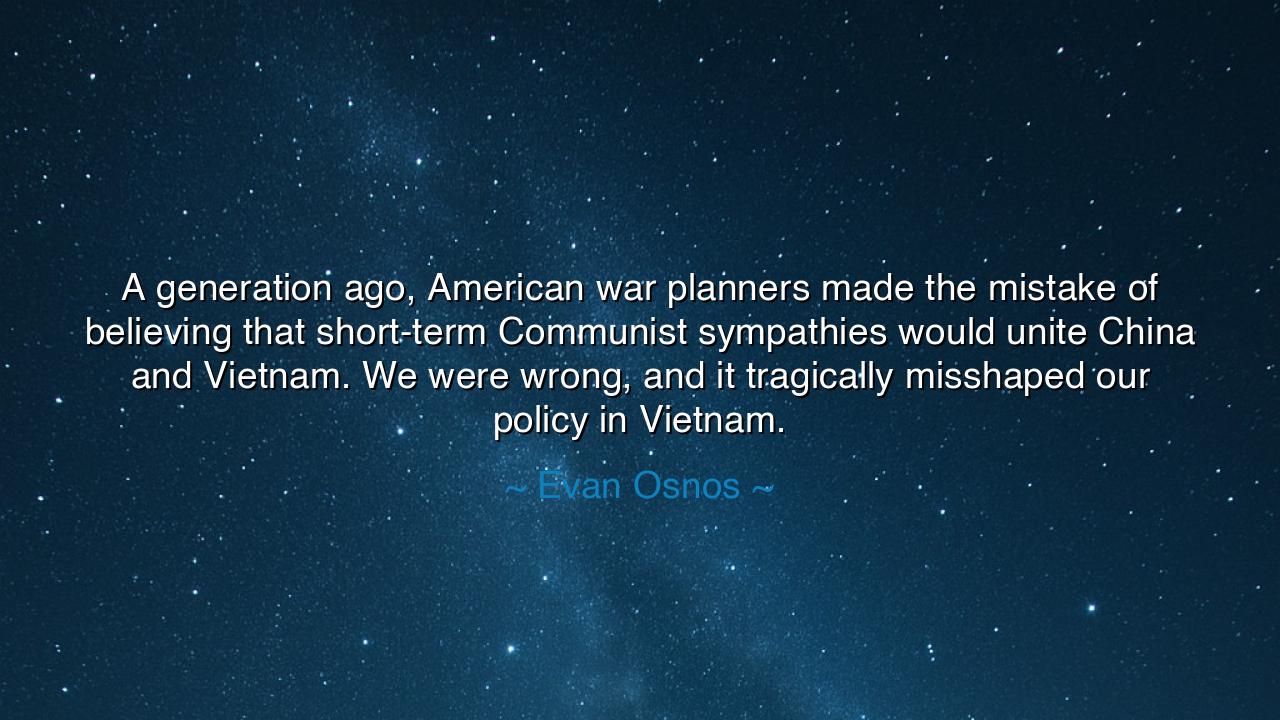
A generation ago, American war planners made the mistake of
A generation ago, American war planners made the mistake of believing that short-term Communist sympathies would unite China and Vietnam. We were wrong, and it tragically misshaped our policy in Vietnam.






Hear, O seekers of wisdom, the words of Evan Osnos, who reflected upon the errors of nations and the weight of history: “A generation ago, American war planners made the mistake of believing that short-term Communist sympathies would unite China and Vietnam. We were wrong, and it tragically misshaped our policy in Vietnam.” In this statement lies not only the recounting of a political misjudgment, but also a timeless lesson about the danger of shallow assumptions, the complexity of alliances, and the tragic costs of misunderstanding the hearts of peoples.
The meaning is thus: American leaders, in the heat of the Cold War, believed that the sympathies of ideology—in this case, Communism—would bind China and Vietnam into an unshakable brotherhood. To them, political banners were stronger than national wounds. Yet they did not perceive the deeper truth: that beneath the surface of shared ideology lay centuries of rivalry, distrust, and struggle for sovereignty. The planners saw the outer garment of sympathy, but they did not discern the body of history beneath it. In this blindness, policy was distorted, leading to choices that deepened the tragedy of Vietnam.
The ancients too knew this peril. Consider the story of the Peloponnesian War, when Athens and Sparta formed alliances not out of love but of temporary expedience. Allies who once marched under the same banners turned swiftly into rivals when interests shifted. To mistake temporary sympathy for eternal unity is folly, and it was this very folly that guided American planners, who assumed that the bond of Communist ideology would outweigh the enduring fractures of history.
History itself bears witness in the rift that later emerged between China and Vietnam. Though both were Communist nations, their paths diverged, leading even to open conflict in the 1979 Sino-Vietnamese War. This revealed with cruel clarity that ideology alone cannot erase the deeper forces of nationalism, memory, and geography. Osnos, in his reflection, reminds us that the tragedy of American miscalculation was not merely one of error, but one that led to bloodshed, to misdirected policy, and to the loss of countless lives in Vietnam.
From this arises a broader wisdom: sympathy without understanding is fragile and false. To build policy, friendship, or alliance only on the surface of shared words or banners is to build on shifting sand. True unity requires the deeper work of knowing the history, the grievances, the desires that shape a people. Without this, sympathy is no more than a mirage, and decisions born from it collapse into ruin.
The lesson, then, is this: look beyond appearances, seek the roots, not just the branches. In politics, in relationships, in life itself, do not mistake temporary alignments for eternal bonds. Ask what lies beneath the agreement—what histories shape the heart, what forces move unseen. If American planners had looked beyond ideology, they would have seen that China and Vietnam, though draped in the same red flag, carried centuries of suspicion between them. Their error shows us the price of failing to seek deeper truth.
What, then, should you do in your own life? When entering partnership, whether in friendship, in work, or in community, seek first understanding, not assumption. Listen to the histories of others, discern the hidden tensions, and weigh not only what is said but what is unsaid. Do not be deceived by surface sympathy, for it may vanish with time. Build instead upon foundations of respect, honesty, and knowledge, for only these can endure.
Thus let Osnos’s words be remembered: “We were wrong, and it tragically misshaped our policy.” For in them lies a warning to all who would lead, plan, or judge too quickly. Sympathy without depth is a snare, but understanding with wisdom is a shield. And if you live by this truth, your choices will not be misshaped by illusion, but guided by clarity, leading not to tragedy but to harmony and strength.






AAdministratorAdministrator
Welcome, honored guests. Please leave a comment, we will respond soon